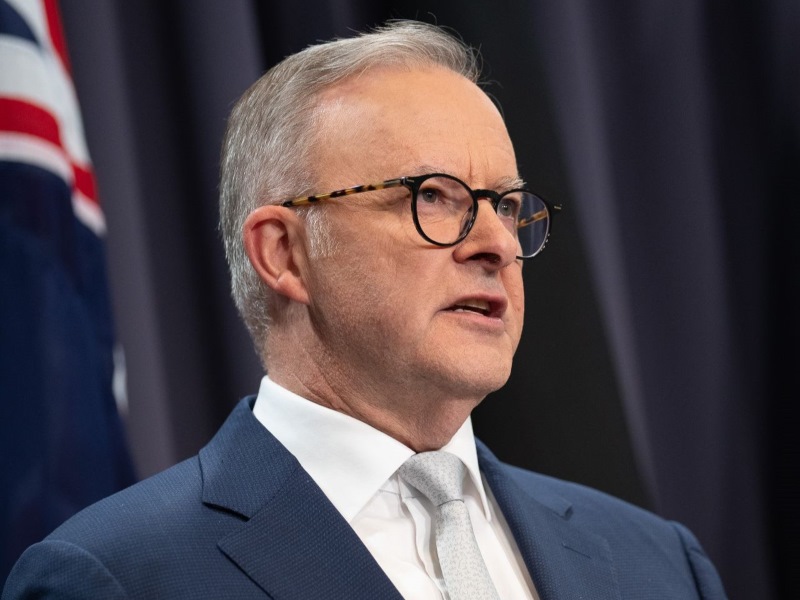Australia PM eyeing trade on China trip despite regional angst
Anthony Albanese kicks off his second visit to China as Australian Prime Minister on Saturday, seeking to bolster recently stabilised trade ties even as geopolitical tensions remain high.
Relations between Beijing and Canberra have charted a bumpy course over the past decade, a period marked by repeated disagreements over national security and competing interests across the vast Pacific region.
Affairs improved in December, when China called off a ban on imported Australian rock lobster, removing the final obstacle in a damaging trade war waged between the countries after ties plummeted in 2017.
“Trade is now flowing freely, to the benefit of both countries and to people and businesses on both sides,” Albanese said ahead of the trip.
But the Labor Party leader’s trip — scheduled to last through Friday — also comes as China’s sweeping territorial claims ruffle feathers across the region, particularly in the South China Sea.
Albanese has said that all issues will be on the table during upcoming discussions with Chinese leaders including President Xi Jinping, making the visit a tricky balancing act as economic and security priorities compete.
“We cooperate where we can, we disagree where we must, and we’re able to have those honest conversations about some of the disagreements that are there,” Albanese told reporters ahead of the trip.
The two countries “have different political systems” and “different values”, he said, adding: “But we’ve got to be able to have that engagement directly.”
Beijing’s foreign ministry said earlier this week that ties between the countries “have continued to improve and grow”.
“China hopes that through this visit, the two sides will strengthen communication, enhance mutual trust (and) expand practical cooperation,” ministry spokeswoman Mao Ning said.
Albanese’s visit to Beijing, Shanghai and Chengdu comes at a fraught moment.
US President Donald Trump’s global tariff blitz has left Australia and other traditional allies of Washington puzzled about their relationship with the world’s top economy, spurring calls to diversify trade ties.
“The visit will not be a walk in the park, especially since Australia also needs to carefully manage its alliance with Trump’s America and emerging disagreements about trade,” said Huong Le Thu, Asia deputy director at the International Crisis Group.
His trip will be aimed at “striking a balance”, she said.
“Ultimately, Albanese and Xi will need to address the security elephant in the room.”
Mutual suspicions have been difficult to shake despite the countries’ recent rapprochement on trade, with Canberra wary of potential national security risks posed by the presence of Chinese technology in the country.
In February, Australia announced a ban on Chinese artificial intelligence-powered chatbot DeepSeek from all government devices, citing privacy and malware risks.
Beijing criticised the move as “politicisation of economic, trade and technological issues”.
Regional anxieties have also remained high since the end of the countries’ trade war last year, with a tense encounter between military planes in February sparking sharp rebukes from both sides.
Another key point of contention is the fate of Darwin Port, whose Chinese-owned controller could be forced to sell it to a local buyer by Albanese’s government.
“Overall, China wants to present the optic that Australia-China has returned to normal, if not friendly,” Jingdong Yuan, an expert on China at the Stockholm International Peace Research Institute, told AFP.
“Beijing probably wants the Darwin issue to go away,” said Yuan.
“China would like to use Trump’s rather abrasive ways in treating friends and foes… to prod Australia to keep some distance from the United States,” he added.
Despite the tensions, China is one of Australia’s most important economic partners, accounting for nearly one third of its total trade.
The prime minister will be accompanied on his visit by a delegation of key business leaders who will attend a CEO roundtable in Beijing.
Albanese will also address tourism and sport during visits to economic hub Shanghai in the east and cultural hotspot Chengdu in the southwest.
You may also like...
Diddy's Legal Troubles & Racketeering Trial

Music mogul Sean 'Diddy' Combs was acquitted of sex trafficking and racketeering charges but convicted on transportation...
Thomas Partey Faces Rape & Sexual Assault Charges

Former Arsenal midfielder Thomas Partey has been formally charged with multiple counts of rape and sexual assault by UK ...
Nigeria Universities Changes Admission Policies

JAMB has clarified its admission policies, rectifying a student's status, reiterating the necessity of its Central Admis...
Ghana's Economic Reforms & Gold Sector Initiatives

Ghana is undertaking a comprehensive economic overhaul with President John Dramani Mahama's 24-Hour Economy and Accelera...
WAFCON 2024 African Women's Football Tournament

The 2024 Women's Africa Cup of Nations opened with thrilling matches, seeing Nigeria's Super Falcons secure a dominant 3...
Emergence & Dynamics of Nigeria's ADC Coalition

A new opposition coalition, led by the African Democratic Congress (ADC), is emerging to challenge President Bola Ahmed ...
Demise of Olubadan of Ibadanland
Oba Owolabi Olakulehin, the 43rd Olubadan of Ibadanland, has died at 90, concluding a life of distinguished service in t...
Death of Nigerian Goalkeeping Legend Peter Rufai

Nigerian football mourns the death of legendary Super Eagles goalkeeper Peter Rufai, who passed away at 61. Known as 'Do...



